- Home
- Christie Golden
Homecoming Page 12
Homecoming Read online
Page 12
“Understood, ma’am,” replied Libby automatically.
Covington’s expression softened slightly. “I know this is unusual for you, Agent Webber, but you’re doing a fine job. We’ll catch the mole, and then whatever happens between you and Lieutenant Kim will stay between the two of you. In the meantime, though, you are serving the Federation, and that has to come before everything.”
“Yes, ma’am,” said Libby, a bit more sincerely. “I am aware of that, and I’ll do my best not to let personal matters interfere.”
“I’m certain you’ll continue to serve well and loyally. Covington out.”
Libby wasn’t so sure. She’d always been a good agent. She had a natural gift for ingratiating herself with people, earning their trust and confidence, and also seeming so innocuous that people didn’t really watch what they said around her. But it was different, playing this deception game with Harry, the one person above all others she ought not to be deceiving.
She hoped Covington was right, that they would identify and capture the mole soon. Harry was moving into her heart too quickly. He was no fool, and sooner or later, he’d begin to ask questions.
And she had no idea how she’d answer them.
Chapter
12
TODAY, Janeway and Carla Johnson were going to go to South Carolina. Workaholic Mark, engrossed in his latest project, had passed on the day at the beach, but had promised to join them for dinner at Spanish Moss, a Charleston institution that had been drawing rave reviews from people whose gastronomic preferences coincided with Kathryn’s. For now, the two women were lounging on the beach. Carla was, with a mother’s skill, carrying on a conversation with Kathryn while watching Kevin with an eagle’s eye. Janeway closed her eyes and turned her face up to receive the sun’s benediction.
“Pity you didn’t request more time off,” Carla said, sipping a mint julep. “I’ve really been enjoying our expeditions. Will your friend Chakotay be joining us when we go to Egypt?”
“I certainly hope so,” Janeway replied. For the last several weeks, ever since she returned from the grim visit to Tevlik’s moon, Janeway had been spending a lot of time with Carla. It had been a long time since she permitted herself to have so much fun. She smiled to herself. She felt. . . well. . . playful lying on a beach in a swimsuit and a big floppy hat. She thought of Neelix and his holographic resort simulation, and knew he would approve. She’d have to call in some favors and have a chat with him soon. She missed the ebullient little Talaxian, and felt a brief pang that he wouldn’t be able to join them tonight. What he would have thought of collards, grits, and tasso ham, she couldn’t begin to have guessed. But she knew he’d love the pecan pie.
“Chakotay would be a wonderful person to take on such a trip,” Janeway continued. “He’s so well read about so many ancient civilizations, Earth’s and others. You’d like him.”
“I know I would,” Carla said. “Kevin, honey, don’t touch that.”
“What is it?” asked Janeway.
“I don’t know, but it’s always sound advice with a two-year-old,” Carla said so nonchalantly that Kathryn burst into laughter. Carla shot her a friendly grin under her own wide-brimmed hat.
Kevin had now turned his attention to a seashell and was picking it up. With great solemnity, he put the shell to his ear and listened.
“Do you hear the ocean?” Janeway called.
He looked at her as if she were a simpleton. “It’s wight dere,” he said scornfully, pointing at the large blue-gray expanse that rushed ceaselessly onto the shore.
Both women laughed. “Ever thought about having kids?” Carla asked. “They’re a challenge, but as you can see they’re a lot of fun too.”
Janeway debated telling her about the cluster of lizardlike beings that she and Tom had produced, and then decided against it. That one was just too long a story for such an easygoing day.
“I think almost everyone thinks about it once they reach a certain age,” she said, dodging the question neatly. “I’ve just been so busy with my career. And, well, you know about Mark.”
It had long ceased being a touchy subject with the three of them, and Carla didn’t bat an eye.
“Wasn’t there anyone on Voyager who attracted you?” she pressed. “I don’t know about Starfleet rules and regs, but surely, seventy thousand light-years away, I bet you could have bent some rules.”
“Could have. Maybe even should have, but didn’t.” Kathryn sipped her piña colada. Another fun thing she didn’t do often enough. “I didn’t feel that it was the right thing to do. I felt more in charge of these people, more protective, than I would have on a regular mission. A relationship with one of them could have been a problem. If things went wrong, there was no way to ask for a transfer. We all had to live with each other.”
Kevin was now playing with the surf, racing back to shore as it chased him, running after it when it receded. His laughter was a joy to hear. He took a misstep, fell, got smacked with a wave, and started to cry. Just as Carla rose, though, he stopped crying and began his game again.
“I’m glad you were able to take some time with me,” Janeway said. “How’s the experiment going?”
“Brilliantly, as you might expect with Mark as the head of the project,” Carla said. “The cross-pollination technique has been successful in every test we’ve put it to. It puts quadrotriticale to shame. I got bored, which is why I played hooky with you today. I’m ready to take it to the next phase.”
“Which is?”
Carla grinned. “Making a loaf of bread and serving it up with wine and cheese, of course.”
“Now, that sounds like my kind of botany,” Janeway said. Carla and Mark had met while working on improving the germination rate of a genetically engineered type of wheat that would grow in virtually any climate. Once their work had been approved, it was likely that they would be able to feed millions of hungry people. The old techniques of growing grain, grinding it, and making it into wholesome foodstuffs survived in places where replicators weren’t feasible.
Kevin was now squatting with his back toward them and putting something in his mouth. Again.
“Kevin, whatever it is, take it out of your mouth right this minute!” Carla called over to him.
Janeway settled back in her chair and thought about what she might like to have for dinner.
* * *
The restaurant called Spanish Moss, named after the gray-green, curly air-fed plant that had a penchant for draping itself on the massive, mossy live oak trees that even now flourished in what had once been called the Deep South, was as much entertainment center as it was restaurant. Since Voyager had left Earth, there had been a lot of changes. Not all were grim and dark, like the Dominion War. One change that Janeway had particularly noticed was how common holographic technology had become in the civilian sector. What had been cutting-edge technology when she had left seven years ago was now commonplace. At least she had been reassured the food wasn’t holographic. The theme, naturally, was Earth’s antebellum South, and the entrance to the place was the façade of a mammoth, beautifully columned mansion. As guests entered, they were greeted by holographic servers, who politely asked if they wanted to “dress for dinner.” Janeway had heard about this option and immediately said yes.
Mark looked puzzled. “What’s this about?” he asked.
“You may dine in the appropriate clothing for the era, if you like,” Janeway said. “Carla, are you game?”
“You bet!” She handed Kevin to the server, who led the child away to a special area. Baby-sitting was one of the services offered at Spanish Moss. It was one for which all three of the adults were grateful, especially as Kevin seemed unusually truculent this evening. Carla grabbed Kathryn’s hand. “Let’s go be Scarlett.”
They were offered a choice of gorgeous gowns. Janeway selected forest green, and Carla opted for a sky blue that matched her eyes. Quickly the gowns were replicated for them, and holographic fitters helped them into
the complicated clothing.
For a time, Janeway had amused herself aboard Voyager by enacting a holonovel in which she was a governess in the Victorian era. As her breath was forced out of her in a great whoosh by the yanking of stays around her midsection, she suddenly remembered why she had become so disenchanted with that particular scenario.
“Loosen these a bit, please,” she said. Glancing over at Carla, she saw the younger woman’s eyes as wide as saucers, and laughed. “Get yours loosened too, or you won’t be able to eat a bite of the fabulous dinner we’re about to have,” Janeway advised.
“I don’t need much convincing,” Carla gasped. They emerged a few moments later, able to breathe, and greeted Mark. He looked striking in an exquisitely tied cravat and tails.
“Well, well, Rhett Butler has some competition,” said Carla, her eyes dancing. She slipped an arm through her husband’s, and he bowed gallantly.
“And I will be the most envied gentleman at dinner,” he said, extending the other arm to Janeway. Laughing, the three friends went into the open, glorious “mansion” dining hall.
Dinner was fabulous. Janeway had she-crab soup with just the right amount of sherry, followed by fresh shrimp cocktail, grouper in a delicious sauce with cheese grits and collard greens as sides, and the three of them shared magnificent desserts consisting of crème brûlée, pecan pie with freshly whipped cream, and something sinful called a Chocolate Tower. Janeway sighed as she sipped her after-dinner coffee, feeling content. When she had first received Mark’s letter aboard Voyager, she had never imagined this scenario. Some might think it odd that she felt so comfortable with her ex-fiancé and his wife, but she was grateful for the developments.
Suddenly she fell to the floor. Wet, warm coffee splashed her gown. “What the—”
The table, chairs, and indeed everything but the actual food itself had disappeared. A steady drizzle was falling, and Janeway realized they were sitting, none too elegantly, on a base slab equipped with holoemitters. Even the walls had disappeared. The holographic characters remained, however, and stared at their patrons with thinly veiled contempt. Janeway got to her feet, looking as fierce and commanding as it was possible to do in a mid-nineteenth-century ball gown splotched with coffee stains.
“What’s going on?” she demanded.
One of the holograms looked at her. “A revolution,” he announced calmly. He touched something on the floor and a figure appeared in the middle of the room, a human, although he stood much larger than life-size. He was handsome and charismatic, and looked at once apologetic and angry.
“My name is Oliver Baines,” said the man. “I am a human, although you are looking at a holographic recording. At this moment, across Federation space, holograms are rising up to claim the rights that are theirs. They are not animals. They are not slaves, or servants. They are people, people who are just as real as if they were made of flesh and blood instead of photons. They deserve to be fairly compensated for their time and talents, and to be recognized and respected as being equal to organic beings. Many of you have experienced the holographic novel Photons Be Free. The Doctor set forth in that novel the thankless existence a hologram experiences in this culture.”
“Oh, no,” said Janeway softly.
“Many of us—organic humanoids—have unwittingly been condescending and contemptuous of them, treating them as if they had no more rights or emotions than the holographic chairs upon which we sit when we dine. The time has come for this to stop. These are people. We need to treat them as such.
“I have been in touch with many people, organic and nonorganic, and we have decided that the time is right for photonic beings to stand up for their rights. From this moment on until such time as I determine that those rights have been granted, there will be a general strike of all photonic beings who have advanced to a level of sentience. Starfleet and the Federation will shortly be presented with a list of my demands.”
Baines’s face was almost radiant. Janeway recognized the expression of the prophet, the revolutionary, the farsighted and yet so nearsighted madman lost in his own passion, and it chilled her to the bone. And the irony that this was taking place at a restaurant whose theme was the pre–Civil War South—the part of the country that had once advocated slavery—had not escaped her notice.
Her combadge chirped, and she winced inwardly. Straining to hear over the cacophony of noise that surrounded her, she said, “Janeway here.”
“Admiral.” It was Tuvok’s calm voice, an oasis in the midst of chaos. “If I remember correctly, you said you were going to be dining at Spanish Moss this evening. Did you do so?”
“Indeed I did, and if you’re calling to ask how dinner was, it was great. But the after-dinner entertainment left something to be desired. We received a transmission from one Oliver Baines. What do you know about this?”
“Little, at present. My brief search revealed that he is essentially a nonentity. He maintains the holographic workers on Lynarik Prime.”
“Don’t tell me, let me guess,” said Janeway, striding away from the crowd to what shelter a live oak offered from the rain. “The workers are EMH Mark Ones, the same version as the Doctor.”
“Correct. It would appear that Mr. Baines has become fascinated with that particular level of hologram and is striving to get them the recognition they deserve.”
“Kath,” Mark said, “what’s going on?” His crisp outfit was limp and wet, and his dark hair was plastered to his head. Carla clutched Kevin, who was snuffling loudly. The child had ceased fussing and now was unhappily silent. Both Carla and Mark looked as if they were quite frightened but trying desperately to remain composed.
Most of the rest of the patrons weren’t bothering with the latter half of that particular equation. They were alarmed and angry, and there was no one to speak to, as the holograms stood silent and sullen and didn’t even bother to reply when confronted.
“The Doctor’s with Tom Paris,” said Janeway. “I’ll transport in and have a little chat with him. Maybe he can help shed some light on this problem. Janeway out.”
She turned to her friends. “I’m not sure what’s going on, but I may know someone who can help. I’m going to go see him right now. I’m sorry our evening turned out so badly.”
“Kathryn,” said Carla, “do you think that man was telling the truth? That there will be a holographic revolution?”
“He may be trying to stir one up,” Janeway replied, “but he can’t control every hologram out there. Besides, it’s hard to be too afraid of anyone you can turn off with the touch of a button.” She forced a smile. “I’ll let you know when I learn anything.”
Mark nodded. He picked up Kevin from Carla and held his son protectively close.
Janeway looked at the press of people. “Let’s go.”
Chapter
13
THE DOCTOR HUMMED to himself as he polished Chapter Three of Photons, Claim Justice. While he had absolutely no desire to be actively involved in a revolution, he had to admit, Baines’s passion had stirred the creative juices. His sequel had been going nowhere, meandering around with many false starts. Now the Doctor had an exciting plotline—his photonic main character, whom of course anyone experiencing the novel would portray, would be a key player in a peaceful revolt.
Naturally, there would be some hard parts. Nothing worth winning came without cost. And there would be someone who would try to lead Our Hero astray, promising that they shared the same goals when in reality this villain was after violence and bloodshed. Our Hero would be seduced at first, but along about Chapter Five would realize the villain’s true destructive nature and be instrumental in both bringing the villain to justice and obtaining rights for all sentient photonic beings.
He reread a section and nodded his head. “Magnificent,” he said. “This one is Pulitzer-worthy.” He couldn’t wait to play it, but that would have to wait until he had access to a larger facility. Tom Paris had fitted only enough holoemitters to enable the Doc
tor to move about freely. They’d need many more to re-create the lovingly detailed city and the other richly developed characters the Doctor envisioned.
The door chimed. The Doctor frowned. Tom hadn’t given him any express orders as to what to do about visitors, so he glanced up to see who it was. He saw three uniformed Starfleet officers, so of course he immediately called, “Come in.”
The door hissed open. The three men were all of a sort: similar height, gray, mustard-and-black uniforms, black-brown hair, solemn expressions.
“Starfleet security,” one of them said.
“Is there a problem?” the Doctor asked politely.
“That remains to be seen,” the officer said cryptically. They came in and one of them pulled out a tricorder and began to take readings. “May I assume you are the holographic Doctor who served on Voyager?”
The Doctor clasped his hands behind his back and stood on his toes once or twice. “You may,” he said airily.
“I’m Commander Antonio Juarez. These are Lieutenant Commanders Branson and Young. We have some questions for you, if you don’t mind.”
“Not at all. Always delighted to serve Starfleet.” He indicated a chair, but they all remained standing. One of them went over to look at his computer. “Do please be careful,” he called. “I’ve just entered some information and would be quite chagrined if anything happened to it. I detest rewriting.”
Juarez’s head whipped around. “What sort of information?”
“Work on my next holonovel,” the Doctor answered. “It’s a sequel to my first book. You might have heard of it—it’s called Photons Be Free.”
“I have indeed heard of it, Doctor, and it’s part of the reason we’re here. Do you recognize this man?” He handed him a holophotograph.
The Doctor raised his eyebrows. “Indeed I do,” he said. “That’s Oliver Baines. He came to see me a few days ago.”
“What did you discuss?”
The Doctor hesitated. He didn’t want to get Baines into any trouble. After all, in theory, the man and he were comrades.

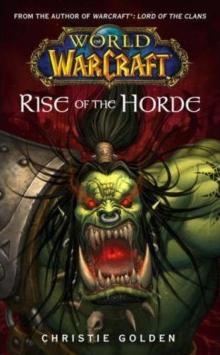 Rise of the Horde
Rise of the Horde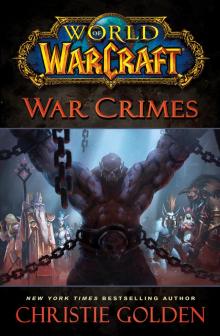 World of Warcraft: War Crimes
World of Warcraft: War Crimes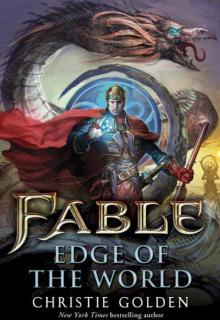 Fable: Edge of the World
Fable: Edge of the World Homecoming
Homecoming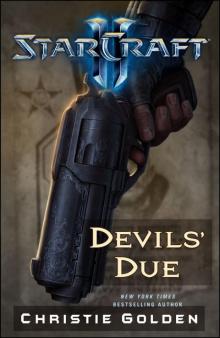 StarCraft II: Devil's Due
StarCraft II: Devil's Due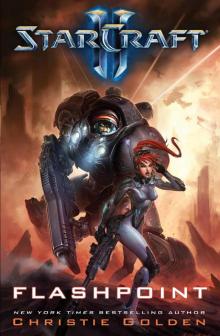 Starcraft II: Flashpoint
Starcraft II: Flashpoint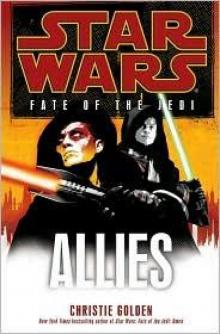 Allies
Allies Shadow Hunters
Shadow Hunters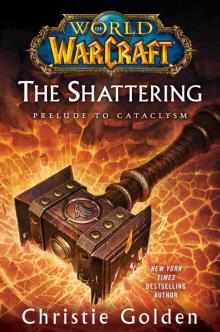 The Shattering: Prelude to Cataclysm wowct-1
The Shattering: Prelude to Cataclysm wowct-1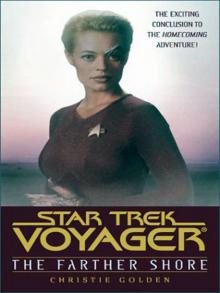 STAR TREK: VOY - Homecoming, Book Two - The Farther Shore
STAR TREK: VOY - Homecoming, Book Two - The Farther Shore King's Man and Thief
King's Man and Thief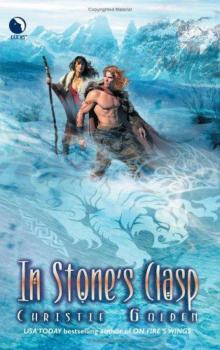 In Stone's Clasp
In Stone's Clasp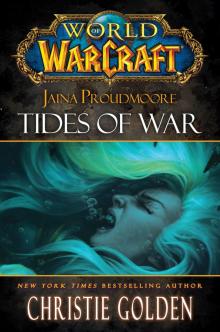 Jaina Proudmoore: Tides of War
Jaina Proudmoore: Tides of War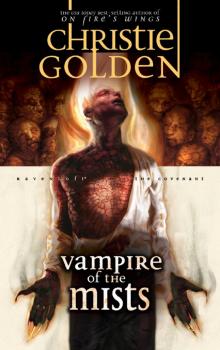 Vampire of the Mists
Vampire of the Mists Star Wars: Fate of the Jedi II: Omen
Star Wars: Fate of the Jedi II: Omen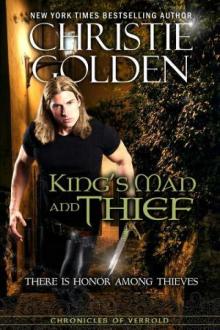 King's man and thief cov-2
King's man and thief cov-2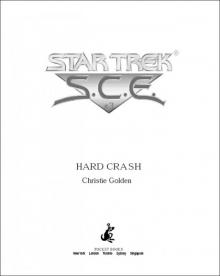 Star Trek
Star Trek StarCraft: Dark Templar: Twilight
StarCraft: Dark Templar: Twilight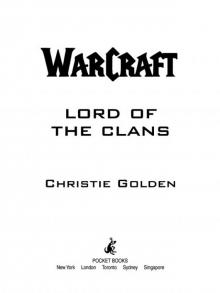 Lord Of The Clans
Lord Of The Clans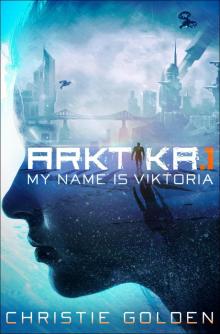 ARKTIKA.1 (Short Story)
ARKTIKA.1 (Short Story)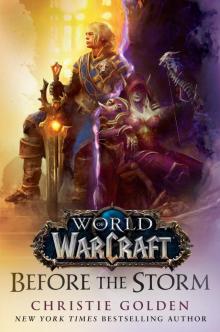 Before the Storm
Before the Storm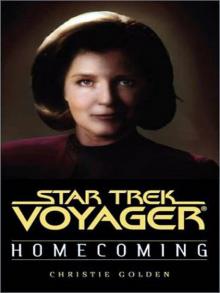 STAR TREK: VOY - Homecoming, Book One
STAR TREK: VOY - Homecoming, Book One Shadow of Heaven
Shadow of Heaven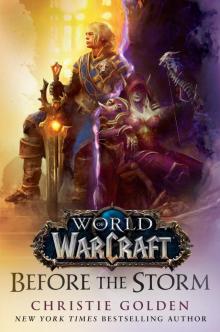 Before the Storm (World of Warcraft)
Before the Storm (World of Warcraft)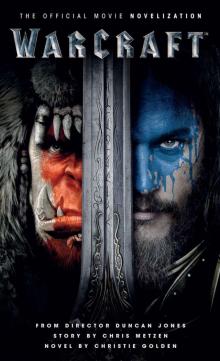 Warcraft Official Movie Novelization
Warcraft Official Movie Novelization Flashpoint
Flashpoint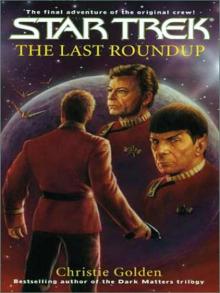 STAR TREK: The Original Series - The Last Roundup
STAR TREK: The Original Series - The Last Roundup On Fire’s Wings
On Fire’s Wings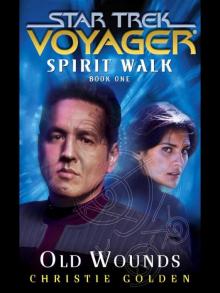 Spirit Walk, Book One
Spirit Walk, Book One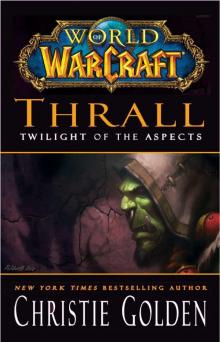 Thrall Twilight of the Aspects
Thrall Twilight of the Aspects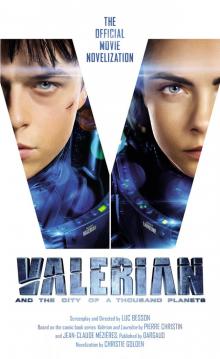 Valerian and the City of a Thousand Planets
Valerian and the City of a Thousand Planets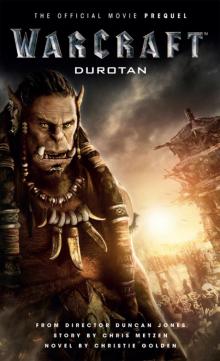 Warcraft
Warcraft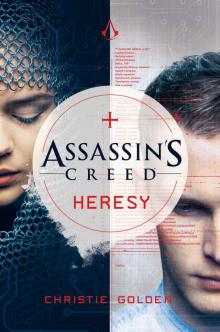 Assassin's Creed: Heresy
Assassin's Creed: Heresy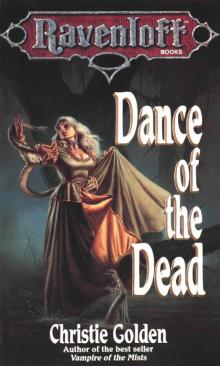 Dance of the Dead
Dance of the Dead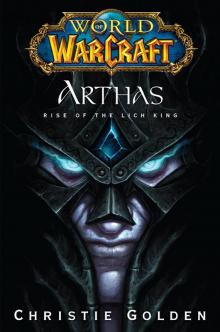 Arthas: Rise of the Lich King wow-6
Arthas: Rise of the Lich King wow-6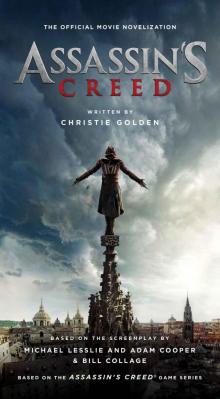 Assassin's Creed: The Official Movie Novelization
Assassin's Creed: The Official Movie Novelization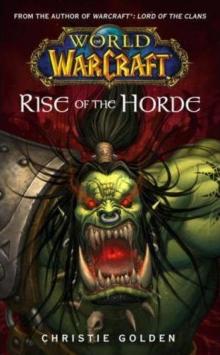 Rise of the Horde wow-2
Rise of the Horde wow-2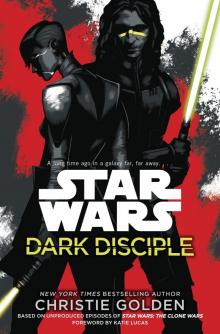 Dark Disciple
Dark Disciple Ghost Dance
Ghost Dance The Shattering
The Shattering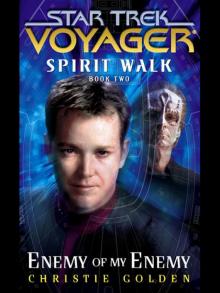 Spirit Walk, Book Two
Spirit Walk, Book Two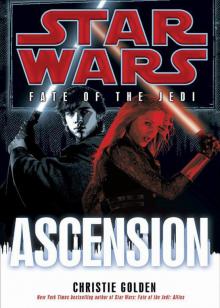 Star Wars: Fate of the Jedi: Ascension
Star Wars: Fate of the Jedi: Ascension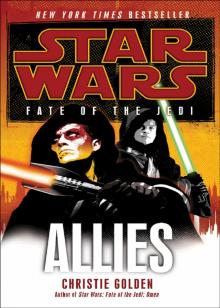 Star Wars: Fate of the Jedi V: Allies
Star Wars: Fate of the Jedi V: Allies The Enemy Within
The Enemy Within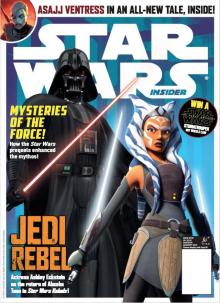 Kindred Spirits
Kindred Spirits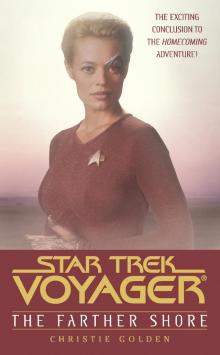 The Farther Shore
The Farther Shore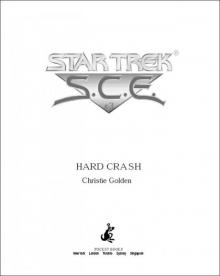 Star Trek: Hard Crash (Star Trek: Starfleet Corps of Engineers Book 3)
Star Trek: Hard Crash (Star Trek: Starfleet Corps of Engineers Book 3) Twilight
Twilight